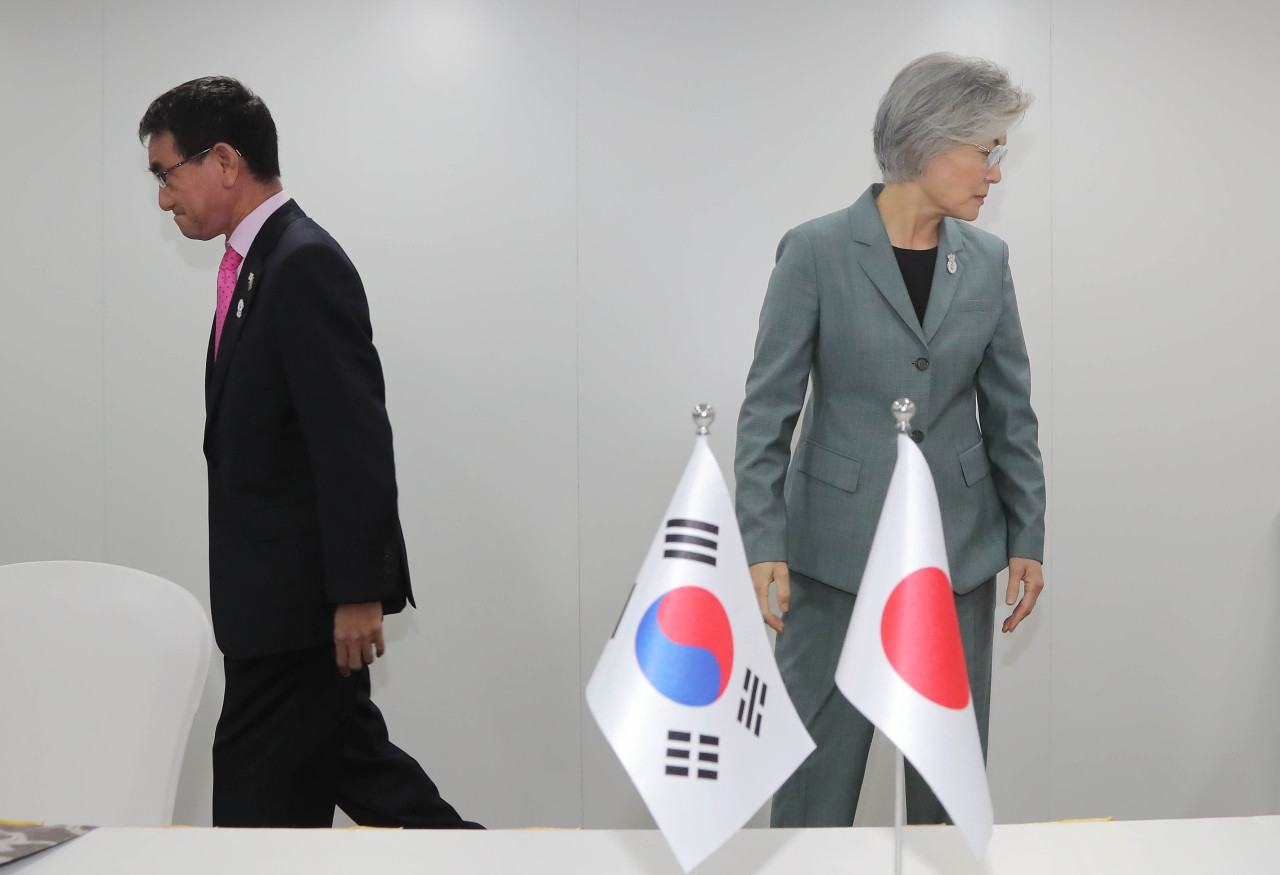S. Korea hints at cutting defense cooperation with Japan
By Choi He-sukPublished : Aug. 1, 2019 - 17:12
Seoul will be forced to reconsider its security cooperation with Tokyo, should Japan take further trade-curbing measures, South Korea’s Minister of Foreign Affairs Kang Kyung-wha said Thursday.
According to Seoul’s Foreign Ministry, Kang gave the warning during her meeting with her Japanese counterpart Taro Kono in Bangkok, on the sidelines of the ASEAN Regional Forum.
“If the decision (to remove South Korea from the trade whitelist) is made at tomorrow’s Cabinet meeting, we will have to draw up necessary response measures,” Kang said after the meeting. She is also reported to have stressed that the two sides should take time to resolve the issue diplomatically.
“(As) Japan’s trade restrictions were taken citing security reasons, we will have to review the South Korea-Japan security (cooperation) structure.”
Early last month, Japan removed South Korea from the list of countries that receive preferential treatment in importing a number of key industrial materials, inciting strong protests from Seoul. Despite the protests, including taking the matter to the World Trade Organization, Tokyo has dug in for a protracted trade spat, proposing removing South Korea from its whitelist of preferred trading partners.
The move, which is likely to be decided on Friday, will result in Japanese firms exporting to South Korea requiring government approval on individual shipments.
While Kang did not elaborate, the comments have been interpreted as referring to the possibility of ending the General Security of Military Information Agreement (GSOMIA) with Japan.
According to Seoul’s Foreign Ministry, Kang gave the warning during her meeting with her Japanese counterpart Taro Kono in Bangkok, on the sidelines of the ASEAN Regional Forum.
“If the decision (to remove South Korea from the trade whitelist) is made at tomorrow’s Cabinet meeting, we will have to draw up necessary response measures,” Kang said after the meeting. She is also reported to have stressed that the two sides should take time to resolve the issue diplomatically.
“(As) Japan’s trade restrictions were taken citing security reasons, we will have to review the South Korea-Japan security (cooperation) structure.”
Early last month, Japan removed South Korea from the list of countries that receive preferential treatment in importing a number of key industrial materials, inciting strong protests from Seoul. Despite the protests, including taking the matter to the World Trade Organization, Tokyo has dug in for a protracted trade spat, proposing removing South Korea from its whitelist of preferred trading partners.
The move, which is likely to be decided on Friday, will result in Japanese firms exporting to South Korea requiring government approval on individual shipments.
While Kang did not elaborate, the comments have been interpreted as referring to the possibility of ending the General Security of Military Information Agreement (GSOMIA) with Japan.

The agreement, signed in 2016, is automatically renewed every year unless either side objects. Following Japan’s decision to impose trade restricting measures, ending the GSOMIA has been raised as a possible retaliatory measure.
According to an official with Seoul’s Foreign Ministry, Kang “strongly conveyed” the message that bilateral relations will deteriorate should Japan remove South Korea from the whitelist.
“(Kang) pointed out that unlike Japan’s claims, the trade restrictions are linked to the forced labor rulings, and therefore removal from the whitelist should not be proceeded with,” the official said, saying that the two sides had “significant” differences.
In removing preferential treatment for South Korea-bound exports of semiconductor-related materials last month, Japanese officials alleged that Seoul had failed to enforce international trade restrictions on North Korea.
Seoul, however, refuted the claims and interpreted the measures as being retribution for South Korea’s Supreme Court’s ruling siding with those forced into working for Japanese firms during Japan’s occupation of the peninsula.
The court ruled on a number of cases that the victims’ rights to claim compensations remain valid, and ordered liquidation of concerned Japanese firms’ assets.
In addition to Kang’s meeting with Kono, the South Korean National Assembly’s delegation to Tokyo looks likely to return empty handed.
Toshihiro Nikai, secretary-general of Japan’s ruling Liberal Democratic Party, canceled a meeting with South Korea’s 10-member National Assembly delegation in Tokyo in the last minute.
Toshihiro Nikai pulled out of the meeting on Thursday morning for the second time following the cancellation on Wednesday evening, citing an urgent party meeting.
“We were supposed to meet Secretary-General Toshihiro Nikai yesterday. It was postponed to this morning, but fell through. This is discourtesy and they broke the rules again,” said delegation member Rep. Kang Chang-il of the Democratic Party.
The meeting had been arranged in hopes of settling Japan’s latest trade restrictions.
Casting a dim outlook, Kang added “A visit by members of Japan’s Liberal Democratic Party has been canceled. Based on this, it seems like (Japan) has a strong desire to push forward (with excluding South Korea from the whitelist).”
Rep. Yoon Sang-hyun of the main opposition Liberty Korea Party, who is chairman of the National Assembly’s Foreign Affairs and Unification Committee and is also in Tokyo, interpreted the last-minute cancellation as a “fait accompli” that Japan will remove South Korea from its whitelist.
“Given the situation, it must have been uncomfortable for Secretary-General Toshihiro Nikai to meet us,” Yoon said.
By Choi He-suk (cheesuk@heraldcorp.com) and Kim Bo-gyung (lisakim425@heraldcorp.com)







![[KH Explains] Hyundai's full hybrid edge to pay off amid slow transition to pure EVs](http://res.heraldm.com/phpwas/restmb_idxmake.php?idx=644&simg=/content/image/2024/04/18/20240418050645_0.jpg&u=20240419100350)







![[From the Scene] Monks, Buddhists hail return of remains of Buddhas](http://res.heraldm.com/phpwas/restmb_idxmake.php?idx=652&simg=/content/image/2024/04/19/20240419050617_0.jpg&u=20240419175937)

![[KH Explains] Hyundai's full hybrid edge to pay off amid slow transition to pure EVs](http://res.heraldm.com/phpwas/restmb_idxmake.php?idx=652&simg=/content/image/2024/04/18/20240418050645_0.jpg&u=20240419100350)

![[Today’s K-pop] Illit drops debut single remix](http://res.heraldm.com/phpwas/restmb_idxmake.php?idx=642&simg=/content/image/2024/04/19/20240419050612_0.jpg&u=)